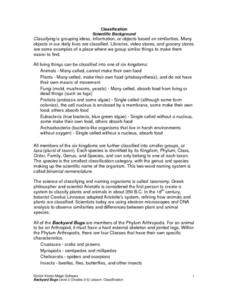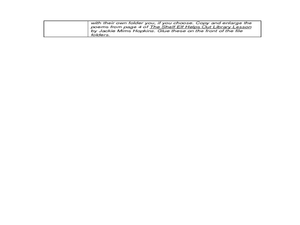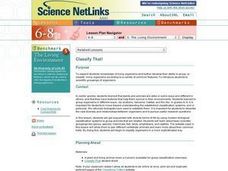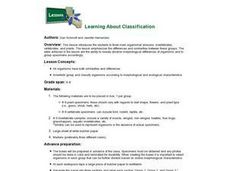Curated OER
Classification Scheme
Fourth graders discuss different classification schemes for living organisms. They group common household items to discover many ways to classify organisms. Students compare/contrast characteristics of each classification.
Howard Hughes Medical Institute
Sorting Seashells
Scientists use morphological, physiological, and molecular information to continually revise organism classification. Scholars observe and learn about 20 shells. Then, they work to sort and classify the shells, building a taxonomy based...
Curated OER
What's Your Classification
Learners classify animals. In this animal groups instructional activity, students watch a video on animal groups and review the six animal groups. Learners practice classifying animals using stuffed animals.
Curated OER
Backyard Bugs
Explore the concept of scientific classification and the similarities and differences between plant and animal species. Your class will participate in hands-on activities by investigating dichotomous keys and classifying their shoes. To...
Curated OER
Hardware Sort
Young scholars classify various hardware items using the attributes of the objects. In this classification instructional activity, students group objects based on their attributes and explain their classification key.
Casimir Middle School
Biological Classification Worksheet
Classify living things with a set of worksheets that has pupils sorting and indentifying living and non-living things. Learners use the worksheets as a basis for finding their answers.
Curated OER
Local Organism Sort
Students determine what characteristics are useful in classifying items. In this sorting organisms lesson students create and explain a classification scheme using familiar organisms.
Curated OER
Book Jacket Match: Practice with the Dewey Decimal Classification System
As a follow-up activity to being introduced to the Dewey Decimal Classification System, 3rd graders listen to poems from Jackie Mims Hopkins' book The Shelf Elf Helps Out and sort book jackets by category and call number.
Jude Mphoweh
Vertebrates and Invertebrates
Spine or no spine? Vertebrate or invertebrate? Learners sort and classify a list of animals as vertebrates or invertebrates into a graphic organizer.
Curated OER
Vertebrate Classification Challenge
Students determine which animals belong to the vertebrate phyla. In this classification instructional activity, students are given large papers with the names of the phyla of vertebrates. They must work together to place organisms...
Curated OER
Classification: Dichotomous Key
Young scholars explain the classification process of organisms. In this biology lesson, students practice writing the names of organisms scientifically. They answer the dichotomous key and discuss answers as a class.
Centre for Innovation in Mamatics Teaching
Area, Perimeter and Volume
Develop young mathematicians' knowledge of two- and three-dimensional shapes with this geometry workbook. From learning about the classifications of different shapes and figures to calculating their area, perimeter, and volume, this...
Curated OER
Species Diversity and Phylogeny
Students explore the classification system of organisms: taxonomy. They examine prepared slides of Protozoans and record information on a Taxonomy Recording Sheet. Two additional classifying activities are also included in this lesson.
Curated OER
Classify That!
Middle schoolers explore diverse forms of life by using modern biological classification systems to group animals that are related. Students then study basic scientific groupings like genus, species, mammals, fish, birds, amphibians,...
Curated OER
Classifying "Pastanimals"
Students explore biology by creating a poster presentation. In this animal classification lesson plan, students utilize a SMART board and practice organizing a group of animal shapes by placing them with similar animal families. Students...
Curated OER
Do You Have the Key?
Students practice using a dichotomous key. In this classification lesson, students read an article about scientific exploration and identification of new species. They use a dichotomous key to identify objects and create their own key.
Curated OER
Introduction To the Classification of Organisms
Students discuss how scientists classify organisms. In pairs, they analyze and label "specimens" of breakfast cereals in order to classify them into the correct group. They create a dichotomous key for several species of animals.
Curated OER
Learning About Classification
Students explore the three main organismal divisions. Students classify organisms by invertebrates, vertebrates, and plants. They observe the differences and similarities between these groups.
Curated OER
Classification of Animals
Students identify observable features of eight dinosaurs and create a sorting chart using SMART Notebook on a SMART Board (or, in case you do not have a SMART Board, a chalk or dry-erase board).
Curated OER
What's Your Genus? Scientific Classification and the VT
Students understand the definition of binomial nomenclature. For this binomial nomenclature lesson, students classify ordinary animals by seeking their scientific names. Students participate in a knowledge hunt using binomial nomenclature.
ARKive
Species Discovery
How many of your students know that even today new species are being found all over the globe? Introduce them to the amazing diversity our planet houses with a creative activity about animal variation and classification. They'll use a...
Curated OER
Doing Dewey
Students discuss the Dewey Decimal Classification System and how it works. They organize ten books according to the Dewey Decimal Classification System.
Curated OER
Sorting and Classifying
Students explore organization by participating in an object sorting activity. In this classification lesson, students view a diagram which details the different ways to sort items. Students practice sorting random objects in class by...
WK Kellogg Biological Station
Plotting Phenology
Finally, a activity that involves more than filling in some blanks. Your budding ecologists must graph and analyze three sets of data, then synthesize the information as they think about the impacts of plant reproduction on insects and...























